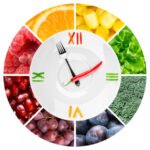Discussion on the Synergy Between Diet and Exercise for Health is often viewed as relying on two distinct pillars: diet and exercise. However, these elements are closely intertwined, each impacting the other’s effectiveness significantly.

Credit: Royal B Essentials
A balanced, nutrient-rich diet provides your body with the necessary energy and resources to perform effectively during physical activity. Conversely, without consistent exercise, you might not fully reap the benefits of even the healthiest foods.
In this article, we’ll delve into how diet and exercise combine to boost physical fitness, enhance overall health, and support well-being.
The Role of Diet in Supporting Exercise
Nutrition is vital for providing your body with the energy it needs to exercise and aiding in recovery afterward.
Various foods contribute to distinct functions, including generating energy, repairing muscles, and supporting a healthy immune system.
Carbohydrates: The Main Fuel Source
Carbohydrates serve as the main energy source for your muscles when you exercise. Upon consumption, carbs are converted into glucose and stored in your muscles and liver as glycogen.
This glycogen serves as an immediate energy reserve during moderate to intense physical activities.
If your diet lacks carbohydrates, you might experience sluggishness and fatigue during exercise because your body won’t have sufficient readily available energy.
This is particularly crucial for endurance athletes who need sustained energy over extended periods of activity.
Proteins: Essential for Muscle Repair and Recovery
Carbohydrates serve as the main energy source for your muscles.
Protein plays a crucial role in repairing muscle tissues that are damaged during exercise and is essential for building new muscle mass.
Consuming an adequate amount of protein aids in faster muscle recovery and lowers the risk of injury.
Eating protein-rich foods such as lean meats, eggs, beans, and plant-based options following a workout is essential for muscle repair and growth.
Fats: Providing Long-Lasting Energy
Carbohydrates provide energy for short, high-intensity exercises, whereas fats serve as the body’s main energy source during extended, lower-intensity activities such as walking or cycling.
Incorporating healthy fats, like those in avocados, nuts, seeds, and olive oil, into a balanced diet is essential for maintaining steady energy levels and supporting heart and brain health.
Hydration: Keeping You in Top Form
Maintaining hydration is crucial for optimal performance while exercising. Water plays a key role in regulating body temperature, lubricating joints, and delivering nutrients to cells.
Without sufficient hydration, one might experience diminished performance, fatigue, or even injury.
Ensure you stay hydrated by drinking water before, during, and after exercise, particularly in hot or humid environments.
For extended or more intense workouts, consider using sports drinks with electrolytes to help replace lost minerals such as sodium and potassium.
The Role of Exercise in Enhancing the Benefits of a Balanced Diet
Just as a proper diet supports exercise, physical activity amplifies the benefits of good nutrition. Here’s how:
Boosting Metabolism and Supporting Weight Management
Engaging in regular physical activity boosts your metabolism, enabling your body to burn more calories even while at rest. When paired with a balanced diet, this can make maintaining a healthy weight easier.
Engaging in exercise can prevent the buildup of excess body fat, particularly when you incorporate a combination of cardiovascular and strength training activities.
Boosting Mental Well-Being
A balanced diet coupled with regular exercise can significantly enhance your mood. Engaging in physical activity triggers the release of endorphins, known as the “feel-good” hormones, which may help alleviate symptoms of anxiety and depression.
A diet that includes a balanced mix of fruits, vegetables, lean proteins, and healthy fats promotes brain health and can improve mental clarity as well as emotional well-being.
Enhancing Nutrient Absorption
Physical activity has been proven to enhance the absorption of specific nutrients, such as calcium, which is essential for maintaining healthy bones.
Engaging in weight-bearing exercises like running or strength training promotes bone growth and maximizes the benefits of dietary calcium intake.
Likewise, engaging in physical activity enhances circulation, which helps distribute the vitamins and minerals obtained from food more effectively throughout the body.
How to Combine Diet and Exercise for Optimal Health
For optimal health, you should aim to harmonize your dietary intake with your physical activity. Here are some practical tips for achieving this synergy:
Fuel Before Exercise
Consuming a light meal or snack containing carbohydrates and protein 30 to 60 minutes prior to exercising can supply the necessary energy for your workout.
You might consider having a banana with peanut butter, Greek yogurt topped with berries, or a slice of whole-grain toast spread with avocado.
Eat for Recovery
After a workout, it’s crucial to restore glycogen levels and support muscle repair by eating a mix of carbohydrates and protein within 30 minutes to 2 hours. This approach can accelerate recovery and ready your body for the next session.
After a workout, you might consider having a protein shake with fruit, a chicken salad paired with quinoa, or a turkey sandwich on whole-grain bread.
Listen to Your Body
Each person’s dietary and exercise needs vary, making it crucial to pay attention to your body’s signals and modify your routine accordingly. If you’re experiencing fatigue or struggling with recovery, consider altering your diet or reducing the intensity of your workouts.
Stay Consistent with Both
Maintaining consistency in your diet and exercise routine is crucial. Establish a regular schedule for meals and workouts to build habits that promote long-term health.
Planning your meals ensures you’re consuming balanced, nutrient-rich foods that energize your body. Meanwhile, maintaining regular physical activity is achievable through diverse and enjoyable forms of exercise.
Conclusion
Discussion on the Synergy Between Diet and Exercise for Health is The combination of diet and exercise is unquestionably effective.
Together, they establish a strong basis for attaining optimal health by increasing energy levels, enhancing mental well-being, and lowering the risk of chronic illnesses.
Discussion on the Synergy Between Diet and Exercise for Health supplies essential fuel and nutrients that allow your body to function optimally, while consistent physical activity enhances these nutritional benefits.
Prioritizing both sets you on the path toward a healthier and happier life.










